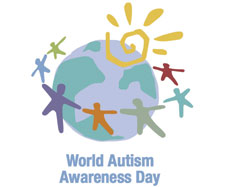Observation
Autism Research in Psychological Science
 April 2 is World Autism Awareness Day, recognized by the United Nations General Assembly for the purpose of improving the lives of people living with autism. According to the organization Autism Speaks, autism affects 1 in 88 children; however, scientists are still working to understand the causes of autism-spectrum conditions (ASC) and develop evidence-based interventions.
April 2 is World Autism Awareness Day, recognized by the United Nations General Assembly for the purpose of improving the lives of people living with autism. According to the organization Autism Speaks, autism affects 1 in 88 children; however, scientists are still working to understand the causes of autism-spectrum conditions (ASC) and develop evidence-based interventions.
An upcoming article in Psychological Science adds another piece of understanding to the autism puzzle. Richard Cook, in collaboration with researchers based at City University London, UK and the Institute of Psychiatry, King’s College London, UK, noted that in the past, some studies have concluded that persons with ASC have trouble identifying faces and facial emotions, but other studies have not found evidence of such deficiencies.
The team drew on these gaps in scientists’ understanding of how people with ASC process faces to test the hypothesis that a personality trait called alexithymia — that is, difficulty identifying and describing emotions — is the real cause of the emotional symptoms associated with autism. About 10 percent of the general population experiences alexithymia, and more than half of people with autism may experience severe alexithymia. However, autism and alexithymia occur independently of each other.
In two experiments, Cook and his colleagues used morph continua (photos that blended the facial features and expressions of two individuals) to test participants’ ability to identify the emotional content of facial expressions, individual faces, and variation in facial expressions. Experiments were performed on two groups — one that consisted of 16 participants diagnosed with ASC, and a second that consisted of 16 participants who did not meet the criteria for ASC. Each group included five alexithymic individuals.
Analysis of the results showed that alexithymia, but not ASC, predicted an impaired ability to recognize emotional expressions. Furthermore, neither alexthymia nor autism predicted participants’ ability to identify individuals based on their facial features or participants’ ability to detect physical differences between facial expressions — axethymia instead appears to impair individuals’ interpretation of emotional content.
Similar studies have shown that empathic brain activity and gaze fixations to emotional social stimui are also better predicted by alexthymia than they are by ASC. Based on their findings, the psychological scientists suggest that it may be appropriate to rethink “the characterization of autism as a disorder with emotional symptoms.” The study also highlights the importance of balancing the number of alexithymic and non-alexithymic individuals used in experiments designed to study autism so that symptoms of alexithymia are not mistakenly attributed to autism. The study is a reminder that scientists have a long way to go toward understanding autism, but every piece of the puzzle is a step toward improving the lives of those affected by ASC.
![]()
Cook, R., Brewer, R., Shah, P., & Bird, G. (2013). Alexithymia, not autism, predicts poor recognition of emotional facial expressions.Forthcoming in Psychological Science.





Comments
Hopefully this will lead to a deeper understanding of autism.
Great to see autism research in the popular psychology journals. Looks like a nice article.
Love this study! It may start the inquires into why some children exhibit “some” indicators of ASC but who are not diagnosed. Hopefully it will open up more research,discussion and support for children, families, and educators.
Doesn’t this appear to support of the concept of separability of autism deficits as described in “Time to give up on a single explanation for Autism” (Happe, F. Ronald, A. Plonim R. Nature Neuroscience, Vol. 9, No. 10, 2006) ?
APS regularly opens certain online articles for discussion on our website. Effective February 2021, you must be a logged-in APS member to post comments. By posting a comment, you agree to our Community Guidelines and the display of your profile information, including your name and affiliation. Any opinions, findings, conclusions, or recommendations present in article comments are those of the writers and do not necessarily reflect the views of APS or the article’s author. For more information, please see our Community Guidelines.
Please login with your APS account to comment.